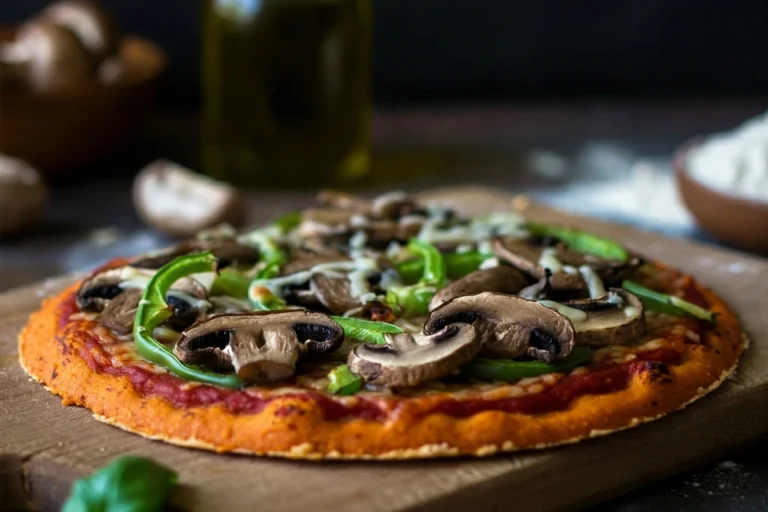When it comes to crafting the perfect pizza, the dough is undeniably the star. But if you’re following a vegan lifestyle or simply curious about the ingredients, you might wonder, is pizza dough vegan? This article unravels the mystery, exploring what goes into pizza dough, the variations that align with veganism, and how to identify vegan-friendly options. By the end, you’ll have all the tools and knowledge to confidently enjoy or create vegan pizza dough.
Let’s begin by laying the groundwork with a detailed introduction to pizza dough and its relationship with veganism.
Introduction to Vegan Pizza Dough
What is Pizza Dough?
Pizza dough is the foundation of one of the world’s favorite dishes. It’s typically made with a few simple ingredients: flour, water, yeast, and salt. These basic elements come together to form the stretchy, pliable base that makes pizzas so delicious. But here’s the catch—many variations exist, and not all are vegan-friendly.
Basic Ingredients of Traditional Pizza Dough
In its simplest form, traditional pizza dough seems harmless enough. However, certain recipes might sneak in non-vegan elements. For instance, some doughs call for milk, butter, or even honey to enhance flavor or texture. These ingredients, while minor, pose a challenge for those committed to a plant-based lifestyle.
Understanding Veganism and Its Dietary Restrictions
Veganism avoids all animal-derived products, making it essential to scrutinize every ingredient in your pizza dough. Even items that seem vegan at first glance, like processed flour or yeast, can sometimes involve animal products during processing. It’s this attention to detail that ensures your dough aligns with vegan principles.
Key Highlights:
- The simplicity of traditional pizza dough masks potential non-vegan pitfalls.
- Common additives like milk and butter are easy to overlook but must be avoided in vegan recipes.
- Understanding vegan principles ensures informed choices when evaluating dough recipes.
Analyzing Traditional Pizza Dough Recipes
Key Ingredients in Traditional Recipes
Traditional pizza dough typically includes flour, water, yeast, and salt. These basic ingredients seem harmless, but they aren’t always vegan-friendly. Recipes often include additional elements like milk, butter, or honey to enhance the flavor or texture. For instance, some chefs add milk powder to make the dough softer or honey for a sweeter taste. These ingredients might seem trivial but can make the dough unsuitable for a vegan diet.
Non-Vegan Additives in Pizza Dough
Certain ingredients like eggs, dairy-based margarine, and whey frequently find their way into pizza dough. Even pre-made doughs from supermarkets sometimes contain these non-vegan additives. Knowing what to look for on ingredient labels is essential to ensure your pizza dough aligns with vegan standards.
Hidden Ingredients to Watch Out For
Processed ingredients, such as enriched flour, can occasionally contain animal-derived vitamins like vitamin D3. Some yeasts, particularly those used in commercial settings, may involve non-vegan production methods. Understanding these nuances helps answer the question, is pizza dough vegan?
What Makes Pizza Dough Vegan?
Key Vegan Ingredients
Vegan pizza dough relies on plant-based ingredients like olive oil instead of butter and maple syrup or agave as sweeteners instead of honey. These swaps ensure the dough remains 100% vegan while preserving its delicious taste and texture.
Substitutes for Non-Vegan Components
Replacing traditional ingredients is easier than you might think. For example:
- Use plant-based milk instead of dairy milk.
- Substitute vegan butter or coconut oil for regular butter.
- Opt for natural sweeteners like agave syrup to replace honey.
These alternatives maintain the integrity of the dough while aligning with vegan principles.
Common Vegan Certifications to Look For
When purchasing pre-made dough, look for vegan certifications or symbols, such as the Vegan Society trademark. These labels guarantee that the product is free from animal-derived components. Popular brands like Boboli and Whole Foods 365 offer options that are both vegan and widely accessible.
For further tips on vegan pizza options, visit Goldy Recipe’s Ultimate Guide to Vegan Pizza to explore topping ideas and preparation tips.
Best Vegan Pizza Dough Recipes
Top 5 Recipes You Should Try
Creating vegan pizza dough at home can be simple and rewarding. Here are five standout recipes:
- Classic Vegan Dough: Made with just flour, water, yeast, and olive oil, this recipe is the epitome of simplicity.
- Whole Wheat Vegan Dough: A healthier twist with added fiber and nutrients from whole wheat flour.
- Gluten-Free Vegan Dough: Ideal for those avoiding gluten, featuring almond or oat flour.
- Herbed Vegan Dough: Includes Italian herbs like oregano and basil for a flavor-packed crust.
- Quick No-Rise Vegan Dough: Perfect for those short on time, ready in just 30 minutes.
These recipes highlight the versatility of vegan pizza dough, proving there’s something for every taste.
Step-by-Step Guide to Making Vegan Pizza Dough
- Activate the Yeast: Combine yeast, warm water, and a pinch of sugar to create a frothy mixture.
- Mix the Dry Ingredients: In a bowl, mix flour and salt. Add herbs or spices if desired.
- Combine Wet and Dry: Slowly add the yeast mixture and olive oil, stirring until the dough forms.
- Knead the Dough: On a floured surface, knead until smooth and elastic.
- Let It Rise: Place the dough in a warm spot, covered, until it doubles in size.
Expert Tips for Perfect Vegan Dough
- Hydration Matters: Too much water can make the dough sticky, while too little makes it tough.
- Warm Environment for Rising: A warm kitchen speeds up the yeast activation.
- Don’t Overwork the Dough: Knead just enough to develop elasticity without overdoing it.

The Science Behind Vegan Pizza Dough
How Yeast Works in Vegan Dough
Yeast is a living organism that creates air pockets in dough by producing carbon dioxide. The lack of non-vegan ingredients like milk doesn’t hinder this process; in fact, simple sugars from flour fuel the yeast perfectly. This ensures your vegan dough rises beautifully.
Role of Gluten in Dough Structure
Gluten, a protein found in wheat, gives pizza dough its chewy texture. When kneaded, gluten forms an elastic network that traps gas from yeast. For gluten-free vegan dough, alternatives like xanthan gum or flaxseed mimic this structure.
Importance of Hydration Ratios
Hydration ratios, the amount of water relative to flour, significantly affect the dough’s texture. A ratio of 60-65% (water to flour) is ideal for most vegan pizza dough recipes, yielding a dough that’s easy to work with and produces a crisp yet tender crust.
For more insights into vegan pizza creations, consider visiting Goldy Recipe’s Ultimate Guide to Vegan Pizza for topping ideas and creative pairings.
Health Benefits of Vegan Pizza Dough
Lower Saturated Fat and Cholesterol
One of the biggest perks of vegan pizza dough is that it’s naturally free of animal-derived fats. Without butter or milk, vegan dough contains significantly less saturated fat and no cholesterol, making it a heart-healthier choice. For those managing cholesterol levels or seeking to reduce unhealthy fats, vegan dough is an excellent option.
Nutritional Content of Vegan Ingredients
Vegan pizza dough often includes whole-grain or nutrient-rich flours, which add fiber, vitamins, and minerals. For instance, substituting white flour with whole wheat or spelt flour can boost the fiber content. Similarly, adding seeds like flax or chia can provide omega-3s and extra protein.
Allergy-Friendly Options
If you’re avoiding dairy or eggs due to allergies, vegan pizza dough is a safe and inclusive choice. Many recipes are also nut-free, and gluten-free vegan options cater to even more dietary restrictions. This adaptability ensures that everyone can enjoy a slice of pizza without worry.
FAQs About Vegan Pizza Dough
Can All Pizza Dough Be Made Vegan?
The short answer is yes—almost any pizza dough recipe can be adapted to vegan standards. By replacing non-vegan ingredients like milk or butter with plant-based alternatives, you can create a vegan-friendly dough. For example, olive oil is a common swap for butter, and plant-based milk can replace dairy milk seamlessly.
What Are the Most Common Non-Vegan Ingredients in Pizza Dough?
You might be surprised to learn that even seemingly harmless ingredients can make you question, is pizza dough vegan? Common culprits include:
- Milk: Added for softness in traditional recipes.
- Honey: Sometimes used as a natural sweetener.
- Butter: Often included for richness in flavor and texture.
Being aware of these ingredients can help you spot non-vegan recipes or pre-made doughs.
Is Store-Bought Pizza Dough Vegan-Friendly?
Store-bought pizza dough varies widely in its ingredients. While many brands offer vegan options, others may contain whey, butter, or milk powder. Always check the label for ingredients or look for a vegan certification. Popular vegan-friendly brands include Whole Foods 365 and Trader Joe’s.
If you’d like to try some delicious topping ideas, visit Goldy Recipe’s Ultimate Guide to Vegan Pizza for creative inspiration!
Tips for Identifying Vegan Pizza Dough
Reading Ingredient Labels Effectively
When asking, is pizza dough vegan? the answer often lies in the ingredient list. Always check for non-vegan ingredients like milk, butter, eggs, or honey. Look out for less obvious ones like whey, casein, or enriched flours with vitamin D3 derived from animal sources. Familiarizing yourself with these terms can save you from unintentionally buying non-vegan dough.
Questions to Ask at Restaurants
Dining out adds an extra layer of complexity, but asking the right questions can help. Always ask if the dough contains any animal-derived products, such as butter or milk. Inquire about the type of oil used; some restaurants may use lard in traditional recipes. Transparency ensures your dining experience aligns with your vegan values.
Trusted Brands and Certifications
When in doubt, stick to brands known for their vegan-friendly options. Look for certifications like the Vegan Society trademark or labels explicitly stating “100% vegan.” These symbols are a quick way to confirm the dough’s suitability for a vegan diet.
Frequently Asked Questions
What Is the Difference Between Vegan and Non-Vegan Pizza Dough?
The primary difference lies in the ingredients. While traditional doughs may include milk, butter, or honey, vegan dough relies on plant-based substitutes like olive oil and agave syrup. The absence of animal products doesn’t compromise taste or texture—vegan dough is just as delicious and versatile.

Can Vegan Pizza Dough Taste Like Regular Dough?
Absolutely! Vegan pizza dough retains the same chewy texture and rich flavor as traditional doughs. Ingredients like olive oil and sea salt add depth, while herbs and spices can enhance the overall taste. Most people won’t notice the difference, especially when topped with your favorite vegan ingredients.
How Do I Make My Pizza Dough Fluffier While Keeping It Vegan?
To make fluffy vegan dough, focus on proper hydration and kneading. Using slightly more water and allowing the dough to rest longer helps create a lighter, airier texture. Adding a touch of sugar can also feed the yeast, promoting a better rise.
If you’re still exploring vegan options, check out Goldy Recipe’s Ultimate Guide to Vegan Pizza for more creative tips and ideas!
Conclusion and Key Takeaways
Recap of Vegan Pizza Dough Essentials
So, is pizza dough vegan? The answer depends on the ingredients used. While traditional recipes may include non-vegan components like milk, butter, or honey, vegan pizza dough relies on plant-based alternatives such as olive oil and agave syrup. With just a few tweaks, almost any dough can be made vegan without sacrificing taste or texture.
Encouragement to Experiment with Recipes
Making vegan pizza dough at home is not only rewarding but also allows you to control every ingredient. Whether you’re crafting a classic crust or experimenting with gluten-free options, there’s a recipe to suit your taste and dietary needs. Remember, the secret to great pizza dough lies in the quality of ingredients, proper kneading, and letting the dough rise adequately.
Final Thoughts
Vegan pizza dough is versatile, delicious, and easy to prepare. Whether you’re enjoying a slice at a restaurant or creating your own masterpiece at home, you can rest assured that vegan dough offers a satisfying, cruelty-free option. Now it’s your turn to get creative—your perfect vegan pizza awaits!
If you’d like more tips or inspiration, explore Goldy Recipe’s Ultimate Guide to Vegan Pizza to elevate your pizza game. Bon appétit!

